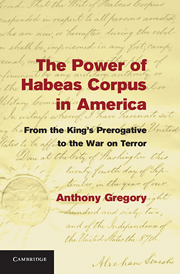As promised, President Obama has halted the Guantánamo Bay military commissions. He is on track to shutter the prison camp and will likely transfer many of the detainees to military prisons at home.
Guantánamo marks a dismal episode in American history, signifying seven years of tension with American tradition, the Constitution, international standards of humane treatment, habeas corpus, and the rule of law. It brings to mind the entirety of Bush’s detention policy—citizens imprisoned without trial, immigrants jailed for months without due process, hundreds indiscriminately rounded up in Iraq and Afghanistan, and “black sites” and foreign dictatorships where captives endure brutal interrogation under the auspices of “extraordinary rendition.”
But Obama should go beyond discontinuing Guantánamo and the commissions and prosecute terror suspects in the U.S. court system and let the rest go. The government successfully prosecuted domestic terrorist Timothy McVeigh, war captive John Walker Lindh and “20th hijacker” Zacarias Moussaoui in federal court. Indeed, Obama should address Bush’s whole detention legacy. As his plan now stands, the fate of even those at Guantánamo is unclear.
One challenge will be the hundreds of detainees cleared for release who lack a country to take them. Perhaps letting the innocent ones live in the United States is the humane solution, but it would be politically scandalous.
For those awaiting trial, Obama’s team suggests that America’s federal courts are inadequate and an entirely new system is needed. In an interview with ABC’s George Stephanopoulos this month, Obama intoned that “it is more difficult than I think a lot of people realize” because “a bunch of folks . . . have been detained . . . who may be very dangerous who have not been put on trial or have not gone through some adjudication. And some of the evidence against them may be tainted even though it’s true. And so how to balance creating a process that adheres to rule of law, habeas corpus, basic principles of Anglo American legal system [without] releasing people who are intent on blowing us up.”
This means that releasing detainees because the evidence was obtained through torture would endanger national security. So the administration wants a new system without Constitutional safeguards for the accused.
This is worrisome. Historically, governments have used foreign territories as prison camps to evade the reach of domestic legal protections. This policy took a hit last June when the Supreme Court recognized habeas corpus as extending to Guantánamo. A new court system at home designed for assumed terrorists and lacking traditional due process could be a step backwards. If Americans tolerate military tribunals on their own soil, what will be next?
Fundamental breaks with the status quo cost political capital. The new Democratic president would have to prioritize the restoration of civil liberties to achieve a total overhaul of Bush’s detention policy.
Unfortunately, on civil liberties, Obama has increasingly become more like Bush. Last year he voted to legalize Bush’s warrantless surveillance program and to provide immunity to those who conducted it illegally. This month, when asked by Stephanopoulos about prosecuting Bush officials, Obama said no one is “above the law” but “extraordinarily talented people [in government] who are working very hard to keep Americans safe” should not “spend all their time looking over their shoulders and lawyering.”
Less encouraging still, Obama is now the most powerful man alive, and power corrupts. As unreliable on civil liberties as he was as Senator, he will likely get worse. He also wants to step up the Afghanistan war, where the first Guantánamo captives originated and where abuses continue at places like the infamous Bagram detention center. As president, Obama might find it easiest to handle political pressures and wage his preferred war by playing it safe, making a few cosmetic changes while leaving much of the Bush policy in place.
If he ignores political expediency, President Obama has a tremendous opportunity to restore America’s reputation of respecting the most basic, minimum standards of the rule of law. Americans who want this to happen must demand it as loudly as they did under Bush.







